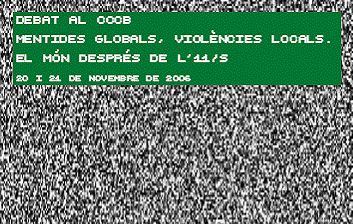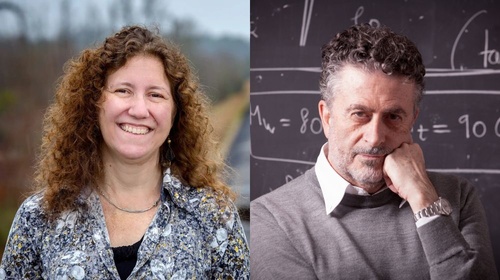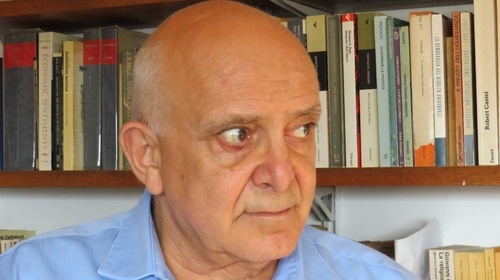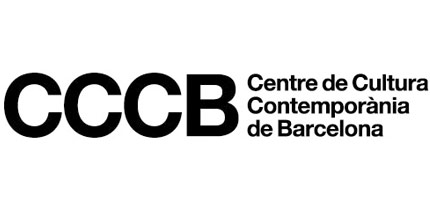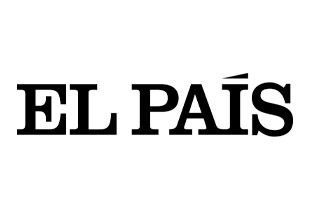Global Lies, Local Violence
The World after 9/11
Debate
Free
From the wars in Afghanistan and Iraq to the fight against terrorism and the growing obsession with new safety mechanisms, this conference proposes reflection on the way the attacks of 9/11 have changed our view of the world.
Beyond the immediate trauma for New York and its inhabitants, the 9/11 attacks represented a new stage in world politics that would be marked by the American interventions in Afghanistan and Iraq, and the ongoing struggle against terrorism. This escalation of violence, justified by the United States as necessary for neutralising security threats, has brought new upheavals to some of the world's most conflict-prone areas without any sign of positive results, even today. Meanwhile, in the West, the phantom of the attacks has given rise to a flourishing discourse that uses the threat of Islamic terrorism to encourage fear and insecurity among citizens. This obsession about security has infiltrated more and more areas of everyday life. However, some years on from the immediate impact of the attacks, it is now time for more serene reflection on their meaning and their effects on the course of international politics. Is the world more insecure after 9/11? What are the real dimensions of the Islamic threat? How effective are the new policies in the name of security, or are they only mechanisms that fuel fear among citizens while being powerless to prevent new catastrophes?
With this seminar, the CCCB and the New School University (New York) are resuming the discussion that they initiated in April 2005. The aim is to reflect further on the impact of the 9/11 attacks and of the 11 March 2004 train bombings in Madrid, and to foster trans-Atlantic dialogue on some of today's major issues.
Monday, 20 November
4.30 p.m. Introduction:
Michael Cohen, Director of the Graduate Program in International Affairs, The New School University.
Josep Ramoneda, Director of the CCCB.
5 p.m. Spaces of Violence 1: The Arab and Islamic World
It is in the Arab and Islamic world that the effects of the war against terrorism have mainly been felt after 9/11. The intervention in Afghanistan and, still more, the war in Iraq have changed the fragile balance of powers in the Near East and jeopardised the West's relations with Arab and Islamic countries, even while the threat of Islamic terrorism seems to be undiminished.
Chair: Antoni Segura, Professor of Contemporary History at the University of Barcelona.
Speakers:
Gema Martín Muñoz, Director of the Casa Árabe (Madrid) and the Instituto Internacional de Estudios
Árabes y del Mundo Musulmán (Cordoba).
"Effects of 9/11 and 11 March on Relations between Europe and the Arab World"
Faisal Devji, Associate Professor of History, The New School University, and author of Landscapes of the Jihad: Militancy, Morality, Modernity (2005).
"The Global War against Terror as a Process of Demilitarisation"
7.30 p.m. Global Perspectives on the Post-9/11 World
What is the source of today's feeling of insecurity? What are the origins of Islamist violence? Although the 9/11 attacks have marked a turning point in our way of seeing the world, if we are to understand the genesis of the present situation, we need to look beyond them to the redefinition of power relations since the Cold War, and the increasingly prominent roles of culture and religion as political arms.
Chair: Judit Carrera, Head of the Academic Programme of the CCCB.
Speakers:
Fred Halliday, Professor of International Relations at the London School of Economics, Visiting Professor at the Barcelona Institute of International Studies, La Vanguardia columnist.
"Globalisation, Hegemony and Revolt: the Shadows of the Cold War"
Arjun Appadurai, Distinguished Professor in the Social Sciences, The New School University.
"Fear of Small Numbers"
Tuesday, 21 November
12 noon. Spaces of Violence 2: Local Violence in the Global Era
The impact of the attacks in the western world has meant that Islamist violence has come to dominate public opinion. However, the post-Cold War world and globalisation have given rise to many local conflicts that are unrecognised in the West.
Chair: Josep Maria Montaner, Architect and Professor at the Escola Tècnica Superior d'Arquitectura de Barcelona.
Speakers:
Michael Cohen, Director of the Graduate Program in International Affairs, The New School University.
"Disasters by Design: Blaming Nature for Political Failures"
Vyjayanthi Rao, Assistant Professor of Anthropology and International Affairs, The New School University.
"On Bombers and Farmers: Suicide in the Global Age"
5 p.m. Spaces of Violence 3: Echoes of Two Attacks
Years after the attacks in New York and Madrid, the wounds are still far from having healed and the respective investigations continue to generate controversy. In New York, the debate on commemorating the victims and the reconstruction of Ground Zero dominate the debate while, in Madrid, the issue of information about the attacks remains at the heart of the political battle.
Chair: Michael Cohen, Director of the Graduate Program in International Affairs, The New School University.
Speakers:
Nikki Stern, former Executive Director of Families of September 11.
"True Lies: Post 9/11 Assumptions by and about Americans"
Enrique Gil Calvo, Professor of Sociology at the Complutense University of Madrid.
"Fabrication of the Enemy: Media Manipulation and Theodicy Politics after 11 March"
7.30 p.m. The Ideology of Fear
The attacks in New York and Madrid revealed the vulnerability of the West and spawned a deep sense of insecurity among citizens. Efforts to prevent further attacks have taken the form of hugely increased security measures, while fear, too, has become a great political asset in justifying the strategies of the war against terrorism. To what extent is the empire of fear reducing our political and individual freedoms?
Chair: Josep Ramoneda, Director of the CCCB.
Speakers:
Joanna Bourke, Professor of History, Birkbeck College, University of London.
"Fear: a Cultural History"
Didier Bigo, Visiting Professor at the Department of War Studies, King's College (London) and researcher at the Centre d'Études et de Recherches Internationales (Paris).
"The Globalisation of Insecurity"
